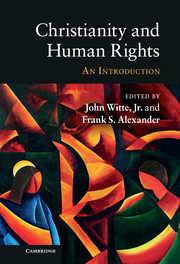Book contents
- Frontmatter
- Contents
- List of contributors
- Acknowledgements
- The first word: to be human is to be free
- Introduction
- FOUNDATIONS AND DEVELOPMENTS OF HUMAN RIGHTS
- 1 The Judaic foundation of rights
- 2 Ius in Roman law
- 3 Human rights and early Christianity
- 4 Human rights in the canon law
- 5 The modern Catholic Church and human rights: the impact of the Second Vatican Council
- 6 Rights and liberties in early modern Protestantism: the example of Calvinism
- 7 Modern Protestant developments in human rights
- 8 The issue of human rights in Byzantium and the Orthodox Christian tradition
- CHRISTIANITY AND THE MODERN HUMAN RIGHTS FRAMEWORK
- Biblical index
- Index
8 - The issue of human rights in Byzantium and the Orthodox Christian tradition
Published online by Cambridge University Press: 05 June 2012
- Frontmatter
- Contents
- List of contributors
- Acknowledgements
- The first word: to be human is to be free
- Introduction
- FOUNDATIONS AND DEVELOPMENTS OF HUMAN RIGHTS
- 1 The Judaic foundation of rights
- 2 Ius in Roman law
- 3 Human rights and early Christianity
- 4 Human rights in the canon law
- 5 The modern Catholic Church and human rights: the impact of the Second Vatican Council
- 6 Rights and liberties in early modern Protestantism: the example of Calvinism
- 7 Modern Protestant developments in human rights
- 8 The issue of human rights in Byzantium and the Orthodox Christian tradition
- CHRISTIANITY AND THE MODERN HUMAN RIGHTS FRAMEWORK
- Biblical index
- Index
Summary
ORTHODOXY AND RIGHTS: SOME BASIC TERMS OF ARGUMENT AND REFERENCE
In many recent fora, the Orthodox Church has been depicted as fundamentally an “Eastern” tradition that has not been squarely represented in the counsels that constituted the formation of Western Christendom. Given that this is an opinion often aired, in explanatory ways, in relation to why the Orthodox Church sometimes takes angular, not parallel, positions in relation to European human rights discourse, it is important to remember that this is fundamentally a late modern view, highly contentious in character, and one that raises as many problems for its inherently orientaliste agenda than it resolves. Insofar as world Orthodoxy still represents a common intellectual allegiance to foundational biblical prescripts, determinative patristic doctrinal and conciliar formulations, and enduringly influential Byzantine social, philosophical, political, and cultural influences then, simply put, it is necessary to insist that the Byzantine Orthodox Christian mentality is quintessentially European. It is, indeed, the seedbed of European Christian civilization; not some debased “oriental” variation on it. The Byzantines (first called such by eighteenth-century English historians) always called themselves Romaioi, the Romans. Greece is not (by any stretch of a non-colonial imagination) the Orient. And would anyone (pace Huntington) still care to argue that Russia's “distinctive difference” lies in its “orientalizing” margins? These old and worn-out slippers have to be laid aside. If there are reasons why many contemporary Orthodox church leaders seem to have problems with modern human rights philosophy, they need to be exegeted from other bases.
- Type
- Chapter
- Information
- Christianity and Human RightsAn Introduction, pp. 173 - 190Publisher: Cambridge University PressPrint publication year: 2010
- 3
- Cited by

